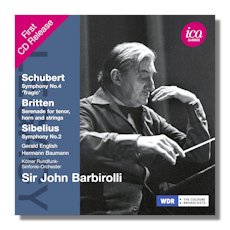
The Internet's Premier Classical Music Source
Related Links
-
Britten Reviews
Schubert Reviews
Sibelius Reviews - Latest Reviews
- More Reviews
-
By Composer
-
Collections
DVD & Blu-ray
Books
Concert Reviews
Articles/Interviews
Software
Audio
Search Amazon
Recommended Links
Site News
 CD Review
CD Review
Sir John in Cologne

- Franz Schubert: Symphony #4 "Tragic"
- Benjamin Britten: Serenade for Tenor, Horn & Strings
- Jean Sibelius: Symphony #2
Gerald English, tenor
Hermann Baumann, horn
Cologne Radio Symphony Orchestra/John Barbirolli
ICA Classics ICAC5096 2CDs
Sir John Barbirolli doesn't get the same kind of attention here as in the UK, but he was among the greats regardless. While his best recordings show him to be a fine interpreter in a wide range of music, his late work shows the effects of illness and age on his creative powers. Add in that he spent much of his career with the Halle, an ensemble that left much to be desired, and his greatness is understandably less documented on disc than would probably be with others. So where does that leave this live Cologne concert a year before his death? It's something special.
The Schubert has a lush Romantic feel about it that is very appealing; the conductor performed it often throughout his lifetime and obviously loves the piece. Outer movements aren't heavy, though, and there's a rhythmic accuracy that sometimes eluded Glorious John in his last years. Balances are admirable considering the live source, which allows the inner movements a great sense of clarity and flow. Check out the second movement andante, which is beautiful in all respects, yet admirably fluid and forward moving. Taken as a whole, it's a worthy reminder of the conductor's craft.
The notes mention that Barbirolli often felt slighted by Benjamin Britten; that his advocacy of the composer's work went unnoticed. Maybe it did; Britten was so good at presenting his own work that someone like Barbirolli might have been overlooked. If there was any real bitterness, it doesn't affect this mostly lovely performance of the Serenade. If anything, it suffers from not being Britten's own reference edition with the composer's partner Peter Pears and Barry Tuckwell on horn. But then, every performance faces this. I'm not entirely enamored with Gerald English's tenor, but he sings in a very personal and touching way, and Baumann plays well. Barbirolli proves an idiomatic Britten conductor working with an orchestra for whom the music must have been relatively unfamiliar.
With the Sibelius Second, we are on to an established Barbirolli specialty. I don't own any of his other renditions of the piece yet, although nearly every version available has fervent admirers. It's not hard to see why. The symphony allows for all of Barbirolli's fabled warmth and heart to practically bleed all over the score. This particular performance, his last ever of the work, has those qualities in abundance but also demonstrates that the aforementioned age and disease had indeed slowed him by early 1969. Barbirolli simply lacks the ability to be as incisive or in command as his younger self. This means sections aren't always together, others feature questionable ensemble. But any fan of the conductor will still want this; the Cologne forces play very well, and if it isn't the best he ever did, it certainly was worth hearing. This applies to the whole of this fine sounding and entirely worthwhile two disc set. I imagine the audience on that February evening was moved. You will be too.
Copyright © 2013, Brian Wigman




















